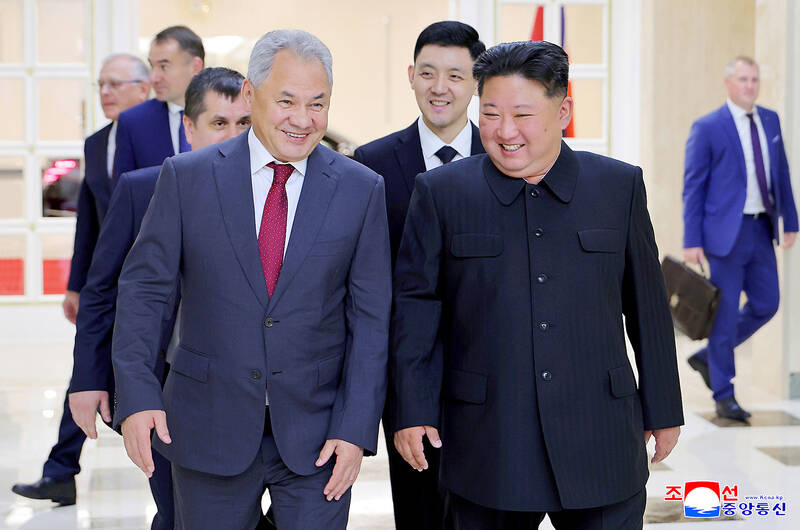North Korea plans to send thousands of military construction workers and deminers to support reconstruction work in Russia’s Kursk region, a top Russian official said on Tuesday, the latest sign of expanding cooperation between the nations.
North Korea has already supplied thousands of combat troops and a vast amount of conventional weapons to back Russia’s war against Ukraine. In April, Pyongyang and Moscow said that their soldiers fought together to repel a Ukrainian incursion into Russia’s Kursk border region, although Ukraine has said it still has troops there.
Wrapping up a one-day visit to Pyongyang, Russian Security Council Secretary Sergei Shoigu said that North Korean leader Kim Jong-un decided to send 1,000 sappers to clear mines in the Kursk region and 5,000 military construction workers to restore infrastructure there, Russia’s state-run TASS reported.

Photo: Korean Central News Agency via EPA-EFE
“Following the expulsion of invaders from Russian soil, we’ve agreed to continue our constructive cooperation, with the Korean side providing assistance in the restoration of the Kursk region,” the state-run RIA Novosti quoted Shoigu as saying. “This is a kind of brotherly aid being sent by the Korean people and their leader, Kim Jong-un, to our country.”
Moscow and Pyongyang agreed to erect memorials in both countries in honor of North Korean soldiers who died while fighting in the Kursk region, TASS and RIA Novosti quoted Shoigu as saying.
The Korean Central News Agency (KCNA) yesterday said that Kim confirmed the contents of North Korea’s cooperation with Russia with regard to Kursk’s current situation, but did not mention the dispatch of army construction workers and deminers cited by Russian media.
KCNA quoted Kim as expressing his resolve to “invariably and unconditionally support” what he called Russian efforts to defend its sovereignty and territorial integrity.
The South Korean Ministry of Foreign Affairs expressed “grave concern” over what it described as ongoing illicit cooperation between North Korea and Russia, while the US Department of State told South Korea’s Yonhap news agency that Pyongyang was “now relying on Russia to provide it with desperately needed funds in exchange for labor and soldier-for-hire schemes.”
South Korea, the US and Japan yesterday flew fighter jets for trilateral aerial training off South Korea’s southern Jeju Island as part of their efforts to boost security cooperation to cope with North Korea’s evolving nuclear threats, the South Korean air force said.

Conflict with Taiwan could leave China with “massive economic disruption, catastrophic military losses, significant social unrest, and devastating sanctions,” a US think tank said in a report released on Monday. The German Marshall Fund released a report titled If China Attacks Taiwan: The Consequences for China of “Minor Conflict” and “Major War” Scenarios. The report details the “massive” economic, military, social and international costs to China in the event of a minor conflict or major war with Taiwan, estimating that the Chinese People’s Liberation Army (PLA) could sustain losses of more than half of its active-duty ground forces, including 100,000 troops. Understanding Chinese

The Ministry of Foreign Affairs (MOFA) yesterday said it is closely monitoring developments in Venezuela, and would continue to cooperate with democratic allies and work together for regional and global security, stability, and prosperity. The remarks came after the US on Saturday launched a series of airstrikes in Venezuela and kidnapped Venezuelan President Nicolas Maduro, who was later flown to New York along with his wife. The pair face US charges related to drug trafficking and alleged cooperation with gangs designated as terrorist organizations. Maduro has denied the allegations. The ministry said that it is closely monitoring the political and economic situation

‘SLICING METHOD’: In the event of a blockade, the China Coast Guard would intercept Taiwanese ships while its navy would seek to deter foreign intervention China’s military drills around Taiwan this week signaled potential strategies to cut the nation off from energy supplies and foreign military assistance, a US think tank report said. The Chinese People’s Liberation Army (PLA) conducted what it called “Justice Mission 2025” exercises from Monday to Tuesday in five maritime zones and airspace around Taiwan, calling them a warning to “Taiwanese independence” forces. In a report released on Wednesday, the Institute for the Study of War said the exercises effectively simulated blocking shipping routes to major port cities, including Kaohsiung, Keelung and Hualien. Taiwan would be highly vulnerable under such a blockade, because it

UNRELENTING: China attempted cyberattacks on Taiwan’s critical infrastructure 2.63 million times per day last year, up from 1.23 million in 2023, the NSB said China’s cyberarmy has long engaged in cyberattacks against Taiwan’s critical infrastructure, employing diverse and evolving tactics, the National Security Bureau (NSB) said yesterday, adding that cyberattacks on critical energy infrastructure last year increased 10-fold compared with the previous year. The NSB yesterday released a report titled Analysis on China’s Cyber Threats to Taiwan’s Critical Infrastructure in 2025, outlining the number of cyberattacks, major tactics and hacker groups. Taiwan’s national intelligence community identified a large number of cybersecurity incidents last year, the bureau said in a statement. China’s cyberarmy last year launched an average of 2.63 million intrusion attempts per day targeting Taiwan’s critical